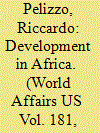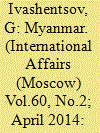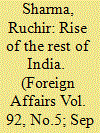|
|
|
Sort Order |
|
|
|
Items / Page
|
|
|
|
|
|
|
| Srl | Item |
| 1 |
ID:
163920


|
|
|
|
|
| Summary/Abstract |
The purpose of this article is to analyze Africa’s progress along the developmental path in the past few decades, to understand what factors were responsible for such success and to identify the risk factors that may compromise further development in the region in the years to come. We advance three basic claims: that Africa has experienced an almost unprecedented (by its standards) level of economic success in the first 15 years of the new millennium, that this success was made possible by a combination of domestic and supranational conditions, and that some of the enabling conditions that supported Africa’s growth and development in the new millennium may be disappearing. The study also suggests that while African countries may not be able to influence the global conditions on which their economic success depends, they do have the ability to influence the domestic conditions. This is why, we suggest, in addition to ensuring longer and healthier lives for their citizens, African countries should consolidate democracy and promote good governance.
|
|
|
|
|
|
|
|
|
|
|
|
|
|
|
|
| 2 |
ID:
130854


|
|
|
|
|
| Publication |
2014.
|
| Summary/Abstract |
If Asia's experience is any guide, economic success is archived only by nations with strong governments, even if they curtail some rights.
Myanmar, formerly Burma, has been increasingly in the focus of international mass media in recent years. The sudden visit paid there in 2011 by Hillary Clinton, was followed in 2012 by that of Barak Obama.
|
|
|
|
|
|
|
|
|
|
|
|
|
|
|
|
| 3 |
ID:
137364


|
|
|
|
|
| Summary/Abstract |
Theories that explain post-Mao China's economic success tend to attribute it to one or several ‘successful’ policies or institutions of the Chinese government, or to account for the success from economic perspectives. This article argues that the success of the Chinese economy relies not just on the Chinese state's economic policy but also on its social policies. Moreover, China's economic success does not merely lie in the effectiveness of any single economic or social policy or institution, but also in the state's capacity to make a policy shift when it faces the negative unintended consequences of its earlier policies. The Chinese state is compelled to make policy shifts quickly because performance constitutes the primary base of its legitimacy, and the Chinese state is able to make policy shifts because it enjoys a high level of autonomy inherited from China's past. China's economic development follows no fixed policies and relies on no stable institutions, and there is no ‘China model’ or ‘Beijing consensus’ that can be constructed to explain its success.
|
|
|
|
|
|
|
|
|
|
|
|
|
|
|
|
| 4 |
ID:
127789


|
|
|
|
|
| Publication |
2013.
|
| Summary/Abstract |
Concepts such as "quality of government" and "good governance" refer to a desired character of the exercise of public authority. Recently the interest in good governance, the quality of government, and similar concepts has increased considerably. However, despite this increasing interest and use, an adequate definition of the concept of quality of government has proved difficult to find. This article criticizes recent attempts at such a definition and proposes an alternative, more complex definition that includes moral content and also encompasses a plurality of values and virtues at its core. An acceptable definition of the quality of governance must be consistent with the demands of a public ethos, the virtues of good decision making and reason giving, the rule of law, efficiency, stability, and a principle of beneficence. The article describes these components in detail and the relations among them.
|
|
|
|
|
|
|
|
|
|
|
|
|
|
|
|
| 5 |
ID:
123046


|
|
|
|
|
| Publication |
2013.
|
| Summary/Abstract |
When Nitish Kumar became chief minister of the dirt-poor Indian state of Bihar in 2005, kidnapping was said to be the leading industry in the capital city of Patna. People searching for stolen cars were advised to check the driveway of a leading politician, who reportedly commandeered vehicles for "election duty." Although known for his soft-spoken manner, Kumar cracked down hard. He straightened out the crooked police, ordering them to move aggressively against all criminals, from the daylight robbers to the corrupt high officials. He set up a new fast-track court to speed the miscreants to jail. As Biharis gained the courage to go out on the street, even after dark, Kumar set about energizing a landlocked economy with few outlets for manufactured exports. He focused on improving the yields of Bihar's fertile soil and ushered in a construction boom. Within a few years, a state once described by the writer V. S. Naipaul as "the place where civilization ends" had built one of the fastest-growing state economies in India. And Kumar was recognized as a leader in the new generation of dynamic chief ministers who are remaking the economic map and future of India.
|
|
|
|
|
|
|
|
|
|
|
|
|
|
|
|
|
|
|
|
|